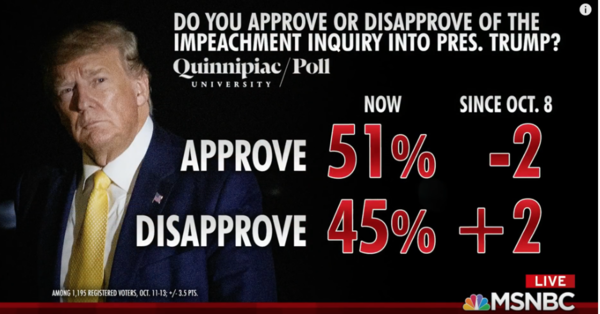Pew Pushes Polling Propaganda
Pollsters are at it again, pushing sketchy polls — not to reflect public opinion, but to shape it. This is called propaganda, a popular tool for dictators who want to control the information flow from an all-powerful government to their subjects, the people.
What once passed for journalism is now mostly propaganda, an effort by major media organizations to insert themselves into the political process, to push their agenda, even if it means throwing any pretense of journalistic principle and integrity to the wind. Look at the Project Veritas undercover videos of CNN for the latest example.
Polls of any type are designed to take a scientific snapshot of opinion at a particular point in time. A small sample is taken from a larger population, and if the sample is representative of the entire population, then the poll should be valid.

YouTube screen grab.
When cooking a sauce, the chef might taste a bit to determine if additional seasoning is needed. If the sauce is mixed properly, then the small sample represents the entire sauce. Polls work the same way. A skewed sample will produce bogus results. This may be accidental or intentional. Which is it? I'll report, you decide, to coin Fox News's latest catchphrase.
Pew Research Center is the latest pollster to weigh in on President Trump and impeachment. Let's see whether its polling sample sauce was well stirred before the pollsters took a taste.
Pew sampled 3,487 "randomly selected" adults between October 1 and 13. That may or may not be representative of the general population, but given that only about half of eligible voters actually vote in presidential elections, a better sample would be registered, or even likely voters.
Who was in that sample? Of the 3,487 total sample, 1,453 were or leaned Republican and 1,942 were or leaned Democrat. In other words, 56 percent Democrat and only 42 percent Republican, a 14-point difference favoring Democrats.
The polling sauce wasn't well mixed, and they sampled the unsalty portion of the pot, leading the chef to believe more salt was needed in the recipe. When served, the sauce will be too salty, just as many pollsters learned on election night 2016.
The Pew poll asked whether "[t]he House should conduct impeachment proceedings against President Donald Trump." Notice that the question is about beginning formal impeachment, not whether Trump should actually be impeached or removed from office. To date, the House has not begun actual impeachment, instead using the House Intelligence Committee to hold secret hearings, excluding Republicans, selectively leaking to the media, all to create a charade of impeachment without the House actually voting for it.
Pew found 54 approving the beginning of an inquiry versus 44 percent opposed, a 10-point difference. If the 14-point difference in political affiliation within the poll sample was negated, there may be a 4-point majority in favor of not beginning impeachment proceedings. The unmixed sauce did not provide a useful taste test for the chef.
Is there a 14-point difference in political affiliation between Democrats and Republicans in the U.S. population? For one measure, look at any recent Trump rally. The crowd outside the rally, as seen below in Dallas, is larger than the actual audience for any of the Democrat candidates: twenty thousand people inside, the same number outside, and many more not even getting tickets. In city after city, week after week.

YouTube screen grab.
Gallup provides a more quantitative assessment. In early September 2019, Gallup polled about party affiliation and found 29 percent Republican, 31 percent Democrat, and a whopping 38 percent independent.
This sample is very different from the one Pew used, explaining the skewed result. Was the Pew poll designed to reflect popular opinion or shape it?
The phrasing of the poll question is also curious. I'm sure a fair number of Republicans actually want the House to begin impeachment proceedings. A few weeks ago, President Trump dared Congress to impeach him. If I were surveyed by Pew, I would agree with Trump and say yes to the House passing an impeachment resolution.
Am I now a RINO turncoat? Hardly. Once an official resolution is passed, Trump and the Republicans can call witnesses, serve their own subpoenas, and participate in the process. This would all be televised, not held in secret by the Intelligence Committee under the nonsensical umbrella of national security. I don't think this is what Pelosi and Schiff really want. To the Democrats, I say, "Put up or shut up."
If the survey asked me if Trump should be impeached, I would say no. But bring on the resolution; I'm fine with that. Make Democrats from House districts Trump won in 2016 go on record to remove a duly elected president based on an innocuous phone call with the Ukrainian president.
Pew is in good company. A recent Fox News poll was conducted by the left-wing Braun Research opinion firm. That firm reported by a 51-43-percent margin that Trump should be impeached and removed from office.
Those pollsters didn't mix their sauce well, either. Their sample of registered, not likely, voters was 40 percent Republican, 48 percent Democrat, and only 12 percent independent. Remember that Gallup noted over a third of the electorate identifying as independent. That's significant, as the Wall Street Journal found only 42 percent of independents favoring impeachment.
If Trump is so unpopular, why are so many turning out at his rallies? Rasmussen, the most accurate pollster in the 2016 presidential election, has a Daily Presidential Tracking Poll. In recent months, Trump has consistently polled ahead of Obama at the exact same point in their respective presidencies. On Friday, October 18, Trump's total approval was 47 percent compared to 44 percent for The One.
Trump has faced virtually nonstop negative media coverage for his entire presidency compared with mostly favorable coverage for Obama. Yet who has the higher approval ratings?
Good luck to the Democrats and NeverTrumps impeaching a popular and successful president, with record low unemployment, a booming economy, and a deliberate avoidance of foreign wars and entanglements.
The House voting for impeachment is a dangerous gambit. If the vote fails, the Democrat base will go ballistic. If the vote passes, vulnerable Democrats may lose in 2020, giving Republicans control of the House. And getting the necessary 67 Senate votes for conviction and removal is extremely unlikely.
Instead, the impeachment narrative is just that: a drumbeat from the media to dispirit Trump and his supporters. The polls provide propaganda, attempting to convince squishy Republican members of Congress to abandon Trump. Watch Trump and his supporters at any rally, and see confidence and enthusiasm, with dispirited faces only on CNN or MSNBC.
Brian C Joondeph, M.D. is a Denver-based physician, freelance writer, and occasional radio talk show host whose pieces have appeared in American Thinker, Daily Caller, and other publications. Follow him on Facebook, LinkedIn, Twitter, and QuodVerum.
FOLLOW US ON
Recent Articles
- Make IRS Sauce The Same For Both Citizen Goose and Politician Gander
- The NYT Prefers its Own Conspiracy Theories
- Would the FDA Pass Its Own Audit?
- War By Other Means: Demographics
- The Trump Administration’s Support for the Israel-Azerbaijan Strategic Partnership Can Benefit America
- This U.S. Under Trump is Strengthening Critical Minerals Sovereignty
- Upheaval and Pushback
- Why Do Democrats Hate Women and Girls?
- There is No Politics Without an Enemy
Blog Posts
- Wasting time is hard to do – leftists still manage it
- Give Trump a chance
- Nina 'Scary Poppins' Jankowicz's ex-NGO partner makes clear 'bankrupting Tesla' is his most important accomplishment
- America’s federal court judges: a self-anointed priesthood.
- Yvette Clarke: Don’t fire the bureaucrats, they’re the efficiency experts!
- Big Balls to the rescue: DOGE saves a terabyte of data destroyed by USIP employees
- As Trump’s EPA tries to recover ‘green’ slush fund dollars, Native communities face energy blackouts
- In Britain, ‘transphobic toddlers’ are the new menace
- One outrage after another: Europe is lost
- Judicial misconduct allegations shake legal system
- Look at all the benefits of socialism!
- French right-wing leader Le Pen banned from running for office
- The case for Alberta as the 51st US state
- Putting tariffs into perspective
- Iran’s nuclear countdown: Can Trump hold the line?






